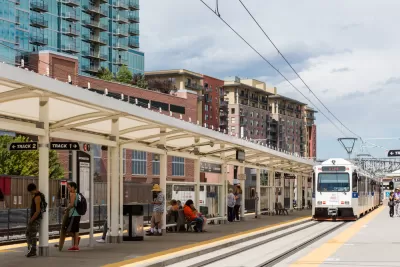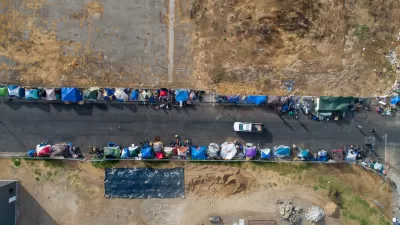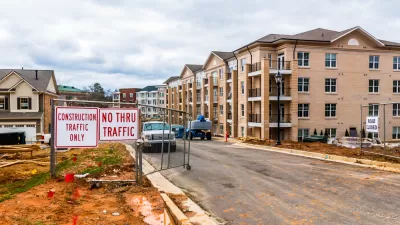An annual survey reveals that mayors want to prioritize spending federal funding on homelessness, transportation, and social services.

Mayors around the country are prioritizing homelessness and transportation as top needs that could be addressed by new federal funding, according to the annual Menino Survey of Mayors. The survey interviewed 126 mayors on issues related to COVID-19 responses, housing, and inequality and how they collaborate with the federal government to meet these challenges.
As Bill Lucia reports, when asked where they might spend their American Rescue Plan Act (ARPA) dollars, "21% of respondents said addressing homelessness, 18% transportation infrastructure, 15% social services, 15% housing and 13% answered either small business, municipal facilities, equity focused programs or broadband." A large majority of mayors believed ARPA funding could make a major difference for their cities.
According to survey results, less than a quarter of cities collect race and ethnicity data when planning climate resilience projects. Meanwhile, 75 percent of cities collect race and ethnicity data when documenting arrests. "Just over half of the mayors said that federal data reporting requirements are either 'very' or 'extremely' important for driving the race and ethnicity data that their cities collect," pointing to a need for more stringent federal regulations regarding data collection.
The report on the survey's finding concludes that, while the pandemic has had transformative effects on communities, mayors and city officials have developed innovative solutions that hold valuable lessons for policymakers at the state and federal levels.
FULL STORY: How Mayors Are Thinking About Prioritizing Federal Aid

Alabama: Trump Terminates Settlements for Black Communities Harmed By Raw Sewage
Trump deemed the landmark civil rights agreement “illegal DEI and environmental justice policy.”

Planetizen Federal Action Tracker
A weekly monitor of how Trump’s orders and actions are impacting planners and planning in America.

The 120 Year Old Tiny Home Villages That Sheltered San Francisco’s Earthquake Refugees
More than a century ago, San Francisco mobilized to house thousands of residents displaced by the 1906 earthquake. Could their strategy offer a model for the present?

In Both Crashes and Crime, Public Transportation is Far Safer than Driving
Contrary to popular assumptions, public transportation has far lower crash and crime rates than automobile travel. For safer communities, improve and encourage transit travel.

Report: Zoning Reforms Should Complement Nashville’s Ambitious Transit Plan
Without reform, restrictive zoning codes will limit the impact of the city’s planned transit expansion and could exclude some of the residents who depend on transit the most.

Judge Orders Release of Frozen IRA, IIJA Funding
The decision is a victory for environmental groups who charged that freezing funds for critical infrastructure and disaster response programs caused “real and irreparable harm” to communities.
Urban Design for Planners 1: Software Tools
This six-course series explores essential urban design concepts using open source software and equips planners with the tools they need to participate fully in the urban design process.
Planning for Universal Design
Learn the tools for implementing Universal Design in planning regulations.
Clanton & Associates, Inc.
Jessamine County Fiscal Court
Institute for Housing and Urban Development Studies (IHS)
City of Grandview
Harvard GSD Executive Education
Toledo-Lucas County Plan Commissions
Salt Lake City
NYU Wagner Graduate School of Public Service





























